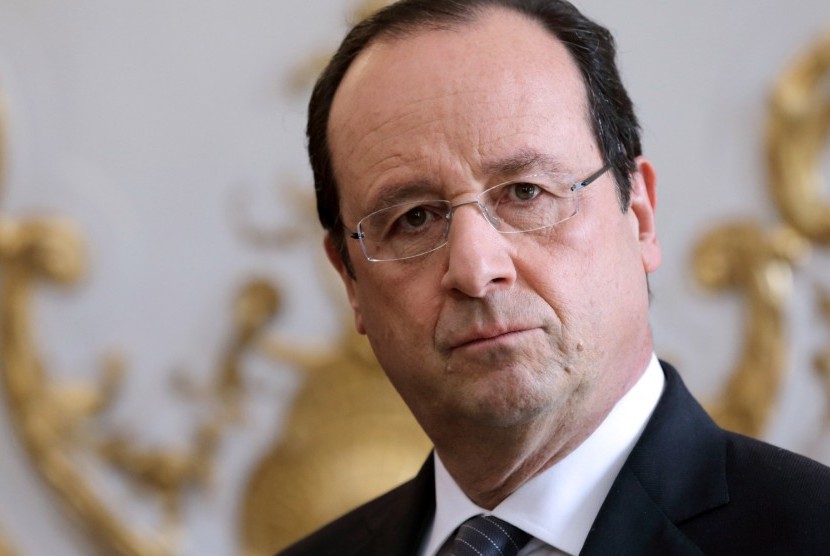REPUBLIKA.CO.ID, ATHENS -- European leaders were on Monday scrambling for a response to a resounding "No" from Greek voters in a referendum on austerity which could send the country crashing out of the eurozone.
German Chancellor Angela Merkel was to meet with French leader Francois Hollande in Paris after Greece overwhelmingly rejected international creditors' tough bailout terms Sunday.
The pair spoke by telephone late Sunday, declaring the decision must "be respected" and calling for an emergency eurozone summit which European Union president Donald Tusk said would be held on Tuesday.
A flurry of other meetings will also be held Monday as European leaders sized up the implications of the vote, a victory for Greece's radical left-wing Prime Minister Alexis Tsipras, who insisted it did not mean a "rupture" with Europe.
With the ramifications still unclear and some analysts putting the chances of a "Grexit" at "very high", European Commission head Jean-Claude Juncker was to hold a teleconference on Monday morning with European Central Bank chief Mario Draghi, Tusk and Eurogroup head Jeroen Dijsselbloem.
Meanwhile German and French finance ministers were set for talks beginning in Warsaw at 0800 GMT, while the Euro Working Group of top treasury officials will meet in Brussels.
European leaders had reacted with a mix of dismay and caution to the figures released by the Greek interior ministry early Monday showing the final tally in the referendum at 61.31 percent "No" and 38.69 percent "Yes", with turnout at 62.5 percent.
Tsipras has "torn down the bridges" between Greece and Europe, Merkel's deputy chancellor, German Economy Minister Sigmar Gabriel, told the Tagesspiegel newspaper.
Despite the Greek premier's assertions, new bailout negotiations now were "difficult to imagine", he said.
Dijsselbloem called the Greek "No" result "very regrettable for the future of Greece".
Britain vowed it would do "whatever is necessary" to protect its own economic security in light of the vote, with a Downing Street spokesman saying Prime Minister David Cameron would chair a meeting Monday to review contingency plans already in place.
In a televised address after the referendum, Tsipras insisted the vote did not mean a break with Europe. He has emphasised that euro membership is meant to be "irreversible", with no legal avenue to boot a country out.
"This is not an mandate of rupture with Europe, but a mandate that bolsters our negotiating strength to achieve a viable deal," he said.
Tsipras said the creditors -- the ECB, the EC and the International Monetary Fund (IMF) -- would now finally have to talk about restructuring the massive, 240-billion-euro ($267 billion) debt Greece owes them.
Greece is teetering on the brink of financial collapse. If it does not receive cash and loans soon from European institutions, it could be forced to resort to government IOUs or a return to the drachma to keep its economy running.
Last Tuesday, the country defaulted on a 1.5-billion-euro repayment to the IMF, becoming the first developed country to fall into arrears to the institution. As a result, it is cut off from further IMF financing until it settles the amount.
The same day, the last bailout for Greece ran out, despite Tsipras's appeals for it to be extended until the referendum was over.
Greece was officially declared in default on Friday by the European Financial Stability Facility, which holds 144.6 billion euros ($160 billion) of Greek loans.
Greek banks are now reportedly almost illiquid after a run by panicked customers in the lead-up to the referendum, which Tsipras abruptly called on June 27 to break an impasse with the creditors.
A weeklong closure of the banks and capital controls that included restricting daily ATM withdrawals to just 60 euros ($67) and blocking money transfers abroad slowed the outflow.
But if the ECB does not inject emergency euros into Greece's banks in the next one or two days, more businesses will go belly up and ordinary Greeks will suffer.
Government spokesman Gabriel Sakellaridis said late Sunday that the Bank of Greece was asking for the ECB to provide money under its Emergency Liquidity Assistance mechanism.


